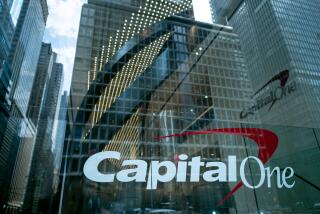Consumer Portfolio Services a subprime-auto-lender survivor
Consumer Portfolio Services Inc. operates on a simple principle: Everyone needs a car.
For more than two decades, the Irvine subprime auto lender, known as CPS, has helped finance vehicles for people who have less than perfect credit.
Employing a network of more than 5,000 new- and used-car dealerships around the country, the company buys up loans after they’re originated, then bundles them with thousands of other loans.
The package of auto notes is rated by credit agencies, cut into pieces as securities and sold to investors. CPS uses the proceeds to buy more loans and repeat the cycle.
“The dealers write the loans, but effectively, we’re the bank,” said CPS founder and Chief Executive Charles E. Bradley.
A former investment banker, Bradley founded the company in 1991 after seeing a vacuum of options for would-be car buyers whose credit histories had black marks.
Historically, such people couldn’t get loans, and because autos are essential for most people to find and hold down employment, they were forced to pay cash for older, low-quality cars.
By tapping Wall Street, CPS provided the option for financing borrowers with dinged credit. The customer pays a high interest rate — typically 18% to 21% — on loans but is often able to get a newer, lower-mileage vehicle in return.
CPS services all the loans it buys, and the securities are structured to be profitable even if many of the borrowers fall behind.
“Even when 18% of the loans aren’t performing, investors want to buy our loans,” Bradley said.
The latest
CPS has been the beneficiary of recent investor appetite for high-yielding securities. With the collapse of the mortgage-backed securities market, bundled subprime auto loans have become highly popular.
And because few companies compete for subprime auto loans — Santander Consumer USA and Capital One Auto Finance are among them — CPS has had little trouble placing its notes.
This year CPS has issued two pools of auto securities worth a total of $390 million and expects two more by year’s end. It’s on pace to issue a total of $750 million in notes this year, up from $550 million last year.
With more money coming in, the company has been able to ramp up loan purchases, expanding its portfolio about 70% in the last two years, to nearly $1 billion.
Last year, it earned $69.4 million on revenue of $187.2 million, but much of that was the result of a onetime tax benefit. For the first quarter this year, CPS reported $3.8 million in profit on $52.1 million in sales.
Accomplishments
CPS has survived two major boom-and-bust cycles that devastated many lenders focusing on subprime loans.
When it opened, Orange County was teeming with ambitious finance companies. “We used to call it the Mesopotamia of subprime,” Bradley jokes. But in the late 1990s, many of those lenders, struggling under too much debt, went under. CPS survived.
Then the mortgage meltdown and the financial collapse of 2007 and 2008 again hit subprime auto hard. CPS, for example, lost a line of credit overnight.
With the market frozen, CPS couldn’t sell any auto-loan-backed securities for about 18 months, forcing it to borrow heavily. Loan originations ground to a halt, and the company laid off 60% of its staff. From 2009 through 2011, CPS lost $105 million.
But CPS pulled through and now is prospering. That’s been reflected in the company’s stock, which dropped to just $0.25 a share in February 2009 and since has climbed to $12.40 in March. CPS is up 275% in the last year.
Challenges
With so much profit in subprime auto, rivals to CPS are emerging, including larger lenders and banks.
CPS also is seeing higher delinquency and default rates, which worries some investors. Still, CPS just renewed a $100-million line of credit with Citibank and also gets financing from Goldman Sachs.
Bradley said the company is paying down its long-term debt, thus presenting an attractive balance sheet to lenders.
“We like to say you can always sleep in your car, but you can’t drive your house,” he said. “This is a stable business model.”
Analyst views
As a small company, CPS doesn’t attract much analyst coverage.
JMP Securities rates it a buy, with a 12-month price target of $11.
“CPS shares should continue to benefit from the ‘scarcity value’ associated with few pure-play opportunities to invest in publicly traded auto finance companies,” wrote David Scharf of JMP, noting that the lender is operated more efficiently than its competitors.
Stephens Inc. has a slightly more conservative view, giving CPS a 12-month target of $9 and a hold rating.
Analyst John Hecht in San Francisco said the stock price is approaching its historical average, and believes its long track record is a plus.
Its experience positions it “as one of the few long-term, independent companies servicing this important segment of specialty finance,” he wrote.






